| Listing 1 - 10 of 35 | << page >> |
Sort by
|
Book
ISBN: 7101016960 Year: 1997 Publisher: 北京 中华书局
Abstract | Keywords | Export | Availability | Bookmark
 Loading...
Loading...Choose an application
- Reference Manager
- EndNote
- RefWorks (Direct export to RefWorks)
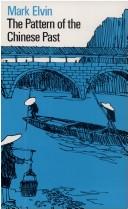
ISBN: 0804708762 Year: 1973 Publisher: Stanford (Calif.) : Stanford university press,
Abstract | Keywords | Export | Availability | Bookmark
 Loading...
Loading...Choose an application
- Reference Manager
- EndNote
- RefWorks (Direct export to RefWorks)
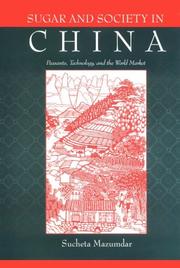
ISBN: 067485408X 1684170257 Year: 1998 Publisher: Cambridge (Mass.) : Harvard university press,
Abstract | Keywords | Export | Availability | Bookmark
 Loading...
Loading...Choose an application
- Reference Manager
- EndNote
- RefWorks (Direct export to RefWorks)
S10/0470 --- S10/0210 --- S04/0680 --- China: Economics, industry and commerce--Commerce inside China: since 1949 --- China: Economics, industry and commerce--General works and economic history: before 1840 --- China: History--Qing: general: 1644 - 1912 --- Sugar trade --- History. --- Sugar bounties --- Sugar industry --- Sweetener industry --- History --- China --- Economic conditions. --- Social conditions --- Sugarcane industry --- Economic conditions
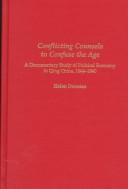
ISBN: 0892641150 047290146X 9780472901463 9780892641154 Year: 2020 Publisher: University of Michigan Press
Abstract | Keywords | Export | Availability | Bookmark
 Loading...
Loading...Choose an application
- Reference Manager
- EndNote
- RefWorks (Direct export to RefWorks)
Conflicting Counsels to Confuse the Age translates and analyzes thirty-eight memorials to the throne and other Qing documents dealing with important issues of Chinese political economy, providing thoughtful and provocative commentary. Subjects covered by the texts include water control, mining, grain trade, pawnshops, brewing, and commercial shipping. The documents also contain detailed discussions of how the state should control wealth, self-interest, profit, hoarding, and the market.In translating these primary sources, Helen Dunstan invites fellow specialists in Chinese studies, including Qing historians, to watch Qing officials and others thinking through problems of political economy and developing arguments to persuade colleagues or superiors. By emphasizing their rhetorical nature and genre conventions, Dunstan offers a reminder that it is improper to use the "information" in such texts without attention to the author's purpose, and without grasping the rhetorical structure of the text as a whole. As a model for close reading, Conflicting Counsels aims to induce greater sensitivity to the nature of Qing records.The second purpose of Conflicting Counsels is to help dispel the notion that economic liberalism is necessarily a Western, "modern" phenomenon. Many of the texts translated record areas of tension and controversy in eighteenth-century approaches to a central project of Confucian paternalist administration, "nourishing the people" (yangmin). Although Dunstan attempts to present both sides fairly, some materials included present the opinion that, in certain vital matters, it was better for the state to stand aside, and leave society's own economic institutions, trade in particular, to handle things. While not a majority, the texts that build some kind of market mechanism argument should be of greatest interest to Qing historians.
China --- History --- Politics and government --- Economic policy --- S04/0690 --- S06/0205 --- S10/0210 --- China: History--Qing: 1644 - 1840 --- China: Politics and government--Government and political institutions: Qing --- China: Economics, industry and commerce--General works and economic history: before 1840 --- Social Science / Cultural & Ethnic Studies / General --- History / Asia / China --- Social Science
Book
ISBN: 9782271137043 2271137047 Year: 2022 Publisher: Paris: CNRS éditions,
Abstract | Keywords | Export | Availability | Bookmark
 Loading...
Loading...Choose an application
- Reference Manager
- EndNote
- RefWorks (Direct export to RefWorks)
Le dynamisme de l'économie chinoise depuis la fin des années 1970 et sa position centrale dans les échanges mondiaux invitent à revisiter une période cruciale, celle de la fin de l'époque impériale (XVIe-XIXe siècle). Au cours de ces trois siècles, la Chine, dont l'économie est pourtant très avancée et florissante, voit se creuser l'écart avec les pays de l'Europe du Nord. Pourquoi ? De multiples explications ont été données de cette longue divergence. Peu de place a pourtant été accordée aux véritables acteurs et aux modalités concrètes de fonctionnement des marchés. C'est cette carence que ce livre entend combler, en donnant la parole aux textes, et en suivant le parcours de trois personnages centraux : le bailleur de fonds, l'intermédiaire, et l'entrepreneur commercial. Réinterroger l'origine de la puissance chinoise, c'est aussi en discerner les lignes de fractures, les points de rupture, les faiblesses. Si la période impériale tardive voit la multiplication de riches marchands, l'entrepreneur capitaliste est absent du paysage. Le capital, fragmenté, n'est pas aisément mobilisable : il est périodiquement détruit ou thésaurisé. À contre-courant de bien des idées reçues sur la prospérité chinoise, cet ouvrage esquisse un audacieux parallèle entre la Chine d'hier et celle d'aujourd'hui. On comprend ainsi que la richesse vient souvent des connivences avec le pouvoir politique, et non pas d'institutions facilitant l'alchimie secrète qui transforme l'épargne en capital.
Capitalism --- History --- China --- Economic conditions. --- Conditions économiques -- Chine --- Economie politique --- S10/0210 --- S10/0220 --- China: Economics, industry and commerce--General works and economic history: before 1840 --- China: Economics, industry and commerce--General works and economic history: 1840 - 1911 --- History. --- Economic conditions
Book
ISBN: 9780415464581 9780415464598 0415464595 0415464587 0203895568 Year: 2008 Publisher: London: Routledge,
Abstract | Keywords | Export | Availability | Bookmark
 Loading...
Loading...Choose an application
- Reference Manager
- EndNote
- RefWorks (Direct export to RefWorks)
A selection of essays from Takeshi Hamashita's oeuvre on Asian trade is here presented to introduce the work of this important historian on China and East Asia's incorporation to the world economy to the English-speaking reader.
China --- East Asia --- Commerce --- History --- Economic conditions --- S10/0210 --- S10/0400 --- S10/0610 --- China: Economics, industry and commerce--General works and economic history: before 1840 --- China: Economics, industry and commerce--Public finance and taxation: general and before 1911 --- China: Economics, industry and commerce--Foreign trade and economic relations: before 1842 --- Asia, East --- Asia, Eastern --- East (Far East) --- Eastern Asia --- Far East --- Orient --- History. --- Economic conditions. --- China - Commerce - History --- China - Economic conditions --- East Asia - Commerce - History --- East Asia - Economic conditions
Book
ISBN: 9780300243734 Year: 2020 Publisher: New Haven, Conn. Yale University Press
Abstract | Keywords | Export | Availability | Bookmark
 Loading...
Loading...Choose an application
- Reference Manager
- EndNote
- RefWorks (Direct export to RefWorks)
"Tea War studies the competition between the tea industries of China and colonial India as an exploration of the history of capitalism. Liu challenges previous histories premised on the technical "divergence" between the West and the Rest, arguing that seemingly traditional technologies and practices were central to modern capitalist development in the tea districts of China and India. He explains how the pressures of competition compelled merchants in China to adopt abstract, industrial conceptions of time, while in India colonial capitalists pushed for labor indenture laws to support factory-style tea plantations. He also explains how characterizations of China and colonial India as premodern backwaters were themselves the historical result of new notions of political economy adopted by Chinese and Indian nationalists, who discovered that these abstract ideas corresponded to the concrete social changes in their local surroundings. Together, these stories point toward more flexible and globally oriented conceptualizations of capitalism"--
S10/0210 --- S10/0220 --- S10/0500 --- S21/0600 --- China: Economics, industry and commerce--General works and economic history: before 1840 --- China: Economics, industry and commerce--General works and economic history: 1840 - 1911 --- China: Economics, industry and commerce--Industries and industrialization: general and before 1911 (economic aspects come here) --- China: Medicine, public health and food--Chinese food and cookery, (incl. tea) --- Relations extérieures --- Chine --- China --- History --- History of Asia --- anno 1800-1899 --- India --- Relations extérieures
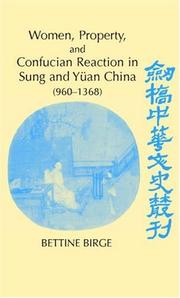
ISBN: 1107113598 1280153172 0511116594 051103976X 0511156677 0511304161 0511511957 0511053827 9780511039768 9780511116599 9780511511950 0521573734 9780521573733 9780521180726 9786610153176 6610153175 0521180724 9780521180726 9781107113596 9781280153174 9780511156670 9780511304163 9780511053825 Year: 2002 Publisher: Cambridge, UK New York, NY Cambridge University Press
Abstract | Keywords | Export | Availability | Bookmark
 Loading...
Loading...Choose an application
- Reference Manager
- EndNote
- RefWorks (Direct export to RefWorks)
This book argues that the Mongol invasion of China in the thirteenth century precipitated a lasting transformation of marriage and property laws that deprived women of their property rights and reduced their legal and economic autonomy. It describes how indigenous social change combined with foreign invasion and cultural confrontation to bring laws more into line with the goals of the radical Confucian philosophers, who wished to curtail women's financial and personal autonomy. This book provides a reevaluation of the Mongol invasion and its influence on Chinese law and society, and presents a new look at the changing position of women in premodern China.
Women --- Feminism --- Social conditions. --- China --- Social conditions --- S10/0210 --- S11/0710 --- China: Economics, industry and commerce--General works and economic history: before 1840 --- China: Social sciences--Women: general and before 1949 --- Femmes --- Conditions sociales --- Chine --- History of Asia --- Sung [Dynasty] --- anno 900-999 --- anno 1000-1099 --- anno 1100-1199 --- anno 1200-1299 --- anno 1300-1399 --- Arts and Humanities --- History --- Women - Social conditions --- China - Social conditions - 960-1644
Book
ISBN: 9789888208081 Year: 2015 Publisher: Hong Kong Hong Kong University Press
Abstract | Keywords | Export | Availability | Bookmark
 Loading...
Loading...Choose an application
- Reference Manager
- EndNote
- RefWorks (Direct export to RefWorks)
S09/0200 --- S09/0495 --- S01/0600 --- S10/0210 --- J0930.60 --- K9026 --- China: Foreign relations and world politics--General works and before 1840 --- China: Foreign relations and world politics--China and Europe --- China: Bibliography and reference--Books, printing, editing and paper --- China: Economics, industry and commerce--General works and economic history: before 1840 --- Japan: Books and magazines -- history -- Kinsei, Edo, Tokugawa period, early modern (1600-1867) --- Korea: Information science and management -- books and publishing --- Book history --- book history --- anno 1500-1799 --- anno 1400-1499 --- anno 1800-1899 --- Europe --- Asia
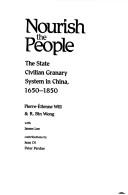
ISBN: 9780892640911 9780892640904 089264091X 0892640901 0472127861 0472901826 9780472127863 9780472901821 Year: 1991 Publisher: Ann Arbor, Michigan : University of Michigan Press,
Abstract | Keywords | Export | Availability | Bookmark
 Loading...
Loading...Choose an application
- Reference Manager
- EndNote
- RefWorks (Direct export to RefWorks)
The Qing state, driven by Confucian precepts of good government and urgent practical needs, committed vast resources to its granaries. Nourish the People traces the basic practices of this system, analyzes the organizational bases of its successes and failures, and examines variant practices in different regions. The volume concludes with an assessment of the granary system's social and economic impact and historical comparison with the food supply policies of other states.
Grain trade --- Granaries --- Food supply --- Agriculture and state --- Céréales --- Greniers (Entrepôts) --- Aliments --- Politique agricole --- Government policy --- History. --- Commerce --- Politique gouvernementale --- Histoire --- Approvisionnement --- S20/0310 --- S10/0210 --- China: Agriculture forestry, fishery, natural disasters--Rice and wheat: general and before 1949 --- China: Economics, industry and commerce--General works and economic history: before 1840 --- Céréales --- Greniers (Entrepôts) --- Grain bins --- Graineries --- Grain --- Storage facilities --- Produce trade --- Food control --- Agriculture --- Food security --- Single cell proteins --- Agrarian question --- Agricultural policy --- State and agriculture --- Economic policy --- Land reform --- History --- Government policy&delete& --- Storage --- History of Asia --- anno 1600-1699 --- anno 1700-1799 --- anno 1800-1899 --- China
| Listing 1 - 10 of 35 | << page >> |
Sort by
|

 Search
Search Feedback
Feedback About UniCat
About UniCat  Help
Help News
News